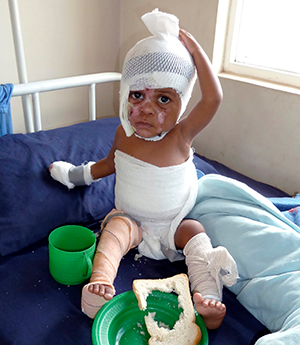Through her nonprofit, Jennifer Wall, PA-C, assistant professor of physician assistant studies, has made a significant impact on patient care in Malawi, where residents are at high risk for burn injuries
In photographs, Malawian families huddle around makeshift fires, where nsima, a traditional cornmeal porridge, bubbles in large pots, and women, dressed in traditional wax-printed cloth garments known as chitenje, labor above. It’s a routine scene — and one posing excessive risks for burns.
The porridge, explains Jennifer Wall, PA-C, assistant professor of physician assistant (PA) studies at the George Washington University School of Medicine and Health Sciences, can spill, scalding children within close proximity, and the chitenje are flammable. Burns are common, particularly among children younger than 6, and, given that access to care can be scarce and expensive, burns are often fatal.

That’s where Wall’s nonprofit, Africa Burn Relief Program, comes in. “The reason I started this foundation is that when I was looking for an opportunity to be on a mission trip, I had a very difficult time being accepted as a PA,” she recalls. Despite having specialized in burn care practice for six years, she says, “unless I was a physician or a nurse, there did not appear to be any opportunities for me.” Having always felt a pull toward Africa, Wall considered joining the Peace Corps. A surgeon at the hospital where she worked, however, cautioned that she would be treating other volunteers, not the Africans she had envisioned and not in her area of expertise. “[My mentor] said, ‘I’ll give you the name and number of someone in rural Malawi who I know needs help with burns — that’s what you’re good at, that’s what you should do,’ ” Wall explains. The physician, an American missionary, invited Wall to come. So the PA, then just 30 years old, decided to “do something big.” She took three months off from work and held a fundraiser, where donations totaled $8,000. She packed two crates of medical supplies and left the East Coast for a remote village that would become the basis for Africa Burn Relief, an official 501(c)(3) nonprofit. “I don’t think people can really understand what’s happening [to burn victims in Malawi] until they see pictures of where [rural Malawians] live and the conditions they are exposed to. It’s happening because they’re simply poor. These families do not have electricity … they’re living in mud huts and dependent on fire for heating and cooking,” Wall says. In the 10-odd years she’s been volunteering in Malawi, she adds, the only development she’s seen has been a paved road to the hospital. The country of roughly 14 million people is largely agricultural, with more than 90 percent of Malawians working as subsistence farmers. Wood is critical for everyday life, and daily fires become the catalyst for injuries. Improving the understanding of how to prevent and treat burns, especially with proper equipment and supplies, could decrease the burden of the injuries, Wall says. “My foundation aims to provide the quality resources that patients and clinicians need and to transfer medical skills and knowledge to our counterparts … known as clinical officers in Malawi, which are very similar to the American physician assistant,” she explains. Over the last decade, Wall has encountered a number of challenges, including establishing trust in her nonprofit, building its reputation, and ensuring sustainability. She’s launched programs in burn prevention, and she became a certified clinical officer in Malawi; she remains in close contact with local clinical officers through WhatsApp, monitoring and providing assistance in real time as much as possible. Clinically, she’s worked to establish protocols for treating second- and third-degree burns, while providing donated equipment and training. She also learned early on that her nonprofit would need to cover the cost of patient care; 72 percent of Malawians live on less than $1 per day, and many would slip away during the night before completing treatment because they were worried about the bill. Difficult cases, she adds, have been especially hard to tackle. There’s been a lack of resources, including specialized services, such as plastic surgeons who can operate on debilitating scars. Severe scars caused by burn injuries, or “contractures,” are particularly devastating for children; many of them won’t attend school with their disabilities. Most patients who would survive in the United States succumb to their injuries in Malawi, but those statistics are improving, thanks to the work of Africa Burn Relief. “The overall survivability (from 2006 to 2010) rose to 96 percent,” Wall says. “The U.S. is about 97 percent, so we have been able to basically increase survival rates [to match those] of the U.S. in this small, rural African hospital.”



